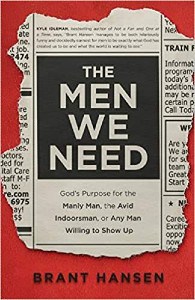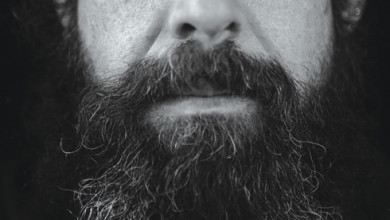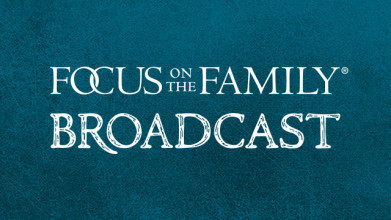
Homemade Meals for Busy Families
Mary Beth Lagerborg, co-creator of Once-A-Month-Cooking, discusses the importance of hospitality and how families can prioritize dinner time by cooking a month’s worth of healthy meals in one session.
Rescue 2x the babies from abortion!
Home » Episodes » Focus on the Family Broadcast » Being the Man Your Family Needs (Part 1 of 2)
Preview:
Brant Hansen: If you don’t bind yourself to causes or things that are important, if you don’t make that decision like one woman forever, you will not be able to experience some of this freedom. Some of this, the joy, the things that could happen later on. You will wind up with yourself.
End of Preview
John Fuller: That’s Brant Hansen. He’s our guest today on Focus on the Family to help us better understand God’s great plan for men and how very important they, we are, to families and to society. Stay with us for a fun, challenging conversation today with your host, Focus on the Family President, Jim Daly. And I’m John Fuller.
Jim Daly: John, I think it’s fair to say a lot of guys today are kinda struggling with aimlessness, what’s my goal? There’s certainly hyper-feminization of the culture, so what are we about, you know? As men, what do we do? I think it was Ted Cunningham, the pastor that’s been on Focus, good friend…
John: Mm-hmm.
Jim: … who once said, “The biggest challenge we face is picking our own parking spot.”
John: (laughs)
Jim: Right? (laughs) And I think the big reason, and I believe our guest today, Brant Hansen, would agree, that people, men particularly, are struggling is, um, we’re seeking pleasure instead of something bigger, a bigger picture, a bigger cause. Uh, maybe you’re feeling like that and you don’t feel, um, that you’re pursuing significance. Today, we’re gonna cover it. The great news is God has a plan and a purpose for your life that is so much bigger than picking your parking spot.
John: (laughs) Right.
Jim: Believe me your life can amount to so much more.
John: Mm-hmm. And Brant Hansen is, uh, heard on more than 200 Christian radio stations. He’s won awards, uh, as National Personality of the Year. He’s the author of a number of books. We’ve had him here before, talking about some of the earlier, uh, titles. This, uh, particular book that’ll make up, uh, the basis for our conversation today is called The Men We Need: God’s Purpose for The Manly Man, The Avid Indoors Man or Any Man Willing to Show Up. And, uh, we’ve got copies of that here at the ministry. Stop by focusonthefamily.com/broadcast or call 800, the letter A, and the word FAMILY. And Brant is married to Carolyn. They have two grown children, and he’s already showed me pictures of his one grandchild.
Jim: (laughs) And that’s so good. Brant, I gotta ask you… Welcome back, first of all.
Brant: Thank you.
Jim: And, uh, you know, what is it like to be the National Personality of the Year? (laughs)
Brant: Well, I’m glad it’s phrased that way ’cause originally in my bio, it was written, “He’s won multiple Personality of the Year awards.”
Jim: (laughs)
John: (laughs)
Brant: Like…
Jim: Yeah.
Brant: … Multiple Personality of the Year?
Jim: Probably not what you want.
Brant: No.
Jim: (laughs)
Brant: We need to rephrase. So…
Jim: Yeah, we are on, we are on a serious topic today but I’m sure we’ll, uh, you know, weave some humor into this because it needs to have some humor. Uh, speak to this idea of toxic masculinity. We hear it all the time.
Brant: Yeah.
Jim: How do you define it? I’m not sure I know how to define it, really.
Brant: Well, uh, okay, so it’s this domineering thing where the g- where a man dominates people.
Jim: So that’s the toxic part?
Brant: I think that’s basically it but this is, this is one reason why I wanted to write the book. Is because masculinity’s been deconstructed so effectively, and so much, and so over and over. And some of that’s been very helpful to deconstruct. “Okay, we shouldn’t do this or that.” Okay, but what’s the construction? Because it’s easy to actually deconstruct things. We can do that very easily. I happened to learn that just by building a Lego tower, like, to, to build a tower to the ceiling for the kids, like, it takes a while.
Jim: (laughs)
Brant: And then they can slap it down in one second and laugh. And it’s like…
Jim: Yeah.
Brant: Yeah, the easy part is taking something down. But does anyone have a construction? Because guys actually need a vision for how to live.
Jim: Yeah, it’s so good. Uh, my thing was the marble thing. You know, you make the marble…
Brant: (laughs) Yeah, absolutely right.
Jim: … that goes around all the stuff and drop?
Brant: Right.
Jim: And the kids will come and they’d run right through it after I rebuilt it. (laughs) It’d be what are you doing? (laughs)
Brant: Same thing with, like, setting up dominoes or whatever. But again, it could be… I, I appreciate saying this is not the way to lead a family. Like, if you’re dominating, you’re, you are operating by fear or you’re, there’s plenty of toxic stuff in our culture. There’s no doubt about it.
Jim: Yeah.
Brant: And but what is the, what is the big picture…
Jim: Yeah, and I-
Brant: … is what, what we’re trying to get at.
Jim: Yeah. And I appreciate the fact that, you know, it’s easy to tear something down. It seems politically, one side wants to tear things down, the other side wants to maintain and hopefully make things better. That’s a generalization, I get it. But that it is easy.
Dr. Dobson used to talk about us being in a, uh, you know, uh, the current of a river. And it just keeps pulling culture downstream. And if you stand against it, you’re gonna get a lot of pressure, right? And I think that’s what the tearing down, another way of saying that.
Brant: Yeah, I think that’s right. And I think it’s also really important. See, because we immediately try to fill in the blank then un-unfortunately, I think. This is coming from my point of view. We fill it in with the trappings of masculinity, not really getting at the heart of it.
Jim: Hm.
Brant: So, I wrote this book, I’m not the typical man book writer. I have neurological problems. I can’t hunt or, you know, I don’t fish. I don’t, I can’t fix stuff. My wife has a “Honey Don’t” list.
Jim: (laughs) Honey don’t.
John: (laughs)
Brant: Just point that out.
Jim: I’ve got the same list.
Brant: Exactly. “Please don’t try this.” But there’s a lot of things I, I’m not good at that stuff.
Jim: Yeah.
Brant: So, if we, if we’re told you gotta be climbing mountains or you gotta be hunting elk, you gotta, like, all that stuff is fine. There’s nothing wrong with that. But is that actually the heart of what God wants us to be? So, I’m, I’m taking a shot at saying this is what it is.
Jim: Well, let’s go there. What is God calling us to be and what’s the role for men in society?
Brant: I think it is what he gave Adam to do, which is be a keeper of the garden. I think that’s it. And he specifically told Adam that this is his job. And when Adam failed to do it, Adam was passive and he failed to protect Eve. He failed to protect the garden. And I think a, a man at his best, this is what I’m trying to tell younger guys, guys in general. Like, “You are at your best when you are someone who creates a space around you where people are secure, uh, where the vulnerable get to thrive. Where, just like in a garden, there’s species in a garden that they couldn’t survive out in the wilderness, but in a garden they, when it’s well kept, they get to thrive and bloom.”
And I think that’s my role. That’s who I am when I’m at my best. And women, when they hear me elucidate this, they wanna stand and applaud.
Jim: Yeah. Let, let’s, uh, capture some of what you’re saying there ’cause you use that, that analogy of the garden from the Garden of Eden. Describe what you’re saying there in greater detail. So, Adam and Eve are created, they’re in the garden, everything’s going well. Uh, they’re walking with the Lord in the cool of the afternoon.
Brant: Mm-hmm.
Jim: Sounds pretty good.
Brant: Yeah. And then I always thought that Adam was way far away, like, naming animals or something when Eve was tempted. But if you read the actual scripture, it’s apparent that he’s right there. He’s with her and he’s doing nothing. And this is a thing, when I talk to family counselors and it happens a lot in, in Christian families too, but there’s the toxic domineering male idea. But there’s also a toxic passivity that can happen too…
Jim: Oh yeah.
Brant: … where you start to check out. I think that’s where Adam is. But when they both blow it, they both sin, when God comes into the garden, he says, “Adam, where are you?” And I think it’s because, “I made you to be the protector of this place. I made you to be the one that could, that, that would be the keeper of this garden and you failed to do it.” So, that is a failure that I have to avoid myself all the time. And I, but I, it’s a task that anybody can do it. You don’t have to be great outdoors men to do this. You could be a accounting professor, you could be, you could be a plumber, you could be anything. But once you understand that this is my role. That people respond to that.
Jim: No, and it’s interesting, and going back to the comment you made about women who applaud you when you speak about this topic. It’s an insight into what they’re actually looking for.
Brant: Yes, totally. So, the thing that tipped me off to this, and I, I talk about this at the beginning of the book because I want to get guys’ attention. But the best-selling poster of all time, I found, in college, it was in every girl’s room in college. And it was at the University of Illinois. This is the late 80s, but it’s still the best-selling poster ever. And it’s a guy. And I asked the, I asked the lady like, “What, what is the deal with this guy? Why is he so attractive?” It’s a picture of a guy. He’s profiled, and I know he is a good-looking guy, but they’re like, “It’s not the guy, it’s the fact that he’s holding this baby. And it’s the way the baby’s looking at him.”
So, it’s just a guy holding a baby. It’s the best-selling poster. And the baby’s look, he’s looking up at this guy and the baby, you could tell is vulnerable, is looking to him for protection. And that captured these, every girl’s heart. That it indicates something to me in the fact that every time when you ask women like, “What’s the most attractive occupation?” They never say radio host, unfortunately. They say Firefighter.
Jim: (laughs)
Brant: And so, I joke about that in the book. I’m like, “It’s guys-”
Jim: We’re out, John.
John: Yeah.
Brant: Well, it’s, I mean, me too, but it’s like, it’s like. But what, what is, what is really attractive about it? I joke in the book, it’s not the reflective pants ’cause I tried that. It didn’t, it didn’t, didn’t work.
Jim: (laughs) That was also an 80s thing.
Brant: Right. Right. It was. (laughs)
Jim: (laughs)
John: (laughs)
Brant: We shall move past that. But it’s like when women respond this way, they find it highly attractive when men create secure spaces around them. And if guys did this role of keeper of the garden, there wouldn’t have been a need for a #metoo movement.
Jim: Yeah. Interesting.
Brant: Yeah.
Jim: Let’s move to another area. I think, uh, what is the most terrifying thing that can happen to a man in his lifetime?
Brant: I think it’s looking back and saying, “I never became who I was supposed to be.”
Jim: Wow. Okay. That hits me with a sludge hammer.
Brant: Well, it, it, it’s, but that’s because it’s, it’s resonant for all of us too.
Jim: Yeah.
Brant: But again, if I’m never given the picture of what is masculinity, if I’m never given the box top for the puzzle where I can see what I’m supposed to be doing, I am, I wind up with all these pieces of, “Okay, big truck, I guess. Um, you know, good with ax throwing,” or whatever it is.
Jim: (laughs)
Brant: Those things are fine. But they’re not the heart of this. And what’s wild too about the, the woman’s instinctual respect for a man like this, she’s attracted originally maybe to your muscles ’cause it looks like you’ll be somebody who’s a protector and somebody who can be st-, provide security. But if you don’t provide security, if you are all about your body, you’re just body building or you just flirt with women or whatever, she’ll resent your muscles. What she’s attracted to is security.
So, you can be a guy that’s not, you, you know, you don’t look like you belong on a fitness magazine cover, doesn’t matter. She will find you very attractive if you’re fulfilling this role of keeper of the garden. I just find that so interesting. And I tell guys, “I don’t want you to do this role just because women think it’s attractive, but that should point you some direction about what we’re actually for and what we are when we’re at our best.”
Jim: Yeah.
Brant: And you can use whatever talents you have to do that.
Jim: Well, and I think, you know, some people are going, “I can’t be reduced to that simple a term.” But you generally, you’re just saying God put a hole in people, in women’s heart for this kind of connection and for men to step up to that kind of behavior and that kind of attraction.
Brant: And I’m saying that women are brilliant and they intuitively know what we are for when we’re at our best. And so, when we abandon that, when we don’t know what we’re for, they will resent that. And they should.
Jim: mm-hmm. That’s interesting.
Brant: So that’s what I’m saying.
Jim: Explain how a life of commitment is different from a life of insulating from personal connection.
Brant: It will make you grow up. It will provide poetry in life. There is no poetry in life without commitment. And I’m trying to tell guys this too, because we all wanna be free agents, especially in a, in a very consumer successful society. But if you don’t, if you don’t bind yourself to causes or things that are important. If you don’t make that decision like one woman, forever, you will not be able to experience some of this freedom, some of this, the joy, the things that could happen later on. You will wind up with yourself. So, I’m trying to tell guys that too, like it, it, the only poetry in life will come from actually binding yourself to the right causes and people and to God.
John: Yeah. So, you’re not saying it has to be in the context of marriage?
Brant: No.
John: That’s a, that’s a great commitment, but not just marriage?
Brant: Doesn’t have to be. In community and o-obviously, like, through your commitment to the Lord, I think, is, is where all of this profundity is gonna come from.
John: Yeah.
Brant: But when you are in community and marriage is a, a hyper intense example of community, when you are, it will make you grow up. A real woman will call you out to actually do things that you don’t want to do.
John: Yeah.
Brant: Like, go to CVS at 2:00 in the morning to go grab something, like, because she doesn’t feel well. Well, a, a fake woman, a pixelated woman on a screen will never ask you to do that.
John: Yeah.
Brant: So, you will remain a boy.
John: Yeah.
Brant: But if you can’t explain to guys, like, why this is better, they can’t, it’s hard for them to put away the childish stuff. Once they have a bigger vision, you can start to go, “Hey, yeah, I don’t wanna do this anymore.”
John: Mm-hmm. Yeah. Yeah. My oldest son as a single, plugged into a church and, and had a, a commitment to the people there. He got a call at 2:00 in the morning from somebody that was in that group and in trouble. And so, um, that’s kind of a parallel for a single person. Again, I think, I, I’m with you, marriage is huge in that ra-, in that way, in that, the way it shapes us.
Brant: Yes.
John: But it’s not the only way.
Brant: No, it’s not. And it’s just a very focused, white-hot, you know, intensity…
John: Deep dive, yeah.
Brant: … uh, furnace to, to change and be, be molden.
John: Yeah. This is Focus on the Family with Jim Daly, and today we’re talking to Brand Hansen about his book, The Men We Need: God’s Purpose for the Manly Man, The Avid Indoors Man, Or Any Man Willing To Show Up. Stop by focusonthefamily.com/broadcast to get your copy. Or call us 800, the letter A, and the word FAMILY.
Jim: Uh, Brant, you came up with six decisions men can make that will set them apart in the ways that we’re talking about. Uh, list those for us and then we’ll spend a little time diving into each one.
Brant: Yeah. The first one is about forsaking the fake and relishing the real, which is a huge issue.
Jim: And what are you aiming at with that statement?
Brant: There are, there are fake ways to live available to us, um, and have been, especially with video games, especially with pornography of it. Especially like…
Jim: … screen stuff.
Brant: … screen stuff, but it’s also, like, it gives you a dopamine hit.
Jim: Uh-huh.
Brant: But it’s not real life. So it’s fake obviously, but it will make you depressed because the reason we feel meaninglessness is because we do meaningless things. I’m convinced of it. I know this from personal experience.
Jim: What, Let me ask you this. I mean, guys that struggle with that, the, you know, this idea of that short term gain versus a long-term commitment to Christ, to your spouse, to your family, etc. It does require decision making.
Brant: Yeah.
Jim: You’re at a fork and you gotta say, “This is more important than that.” But so many guys, you look at some of the data, it’s horrific. Like, 68% of Christian men…
Brant: It is.
Jim: … view pornography. And I find that, that data point shocking, frankly.
Brant: It’s, it’s, but no one’s ever had this before. No one, no culture, no humans in history have ever had this available like this before. And so, what I wanna say in this book too, to guys, is, “I am sorry. The, it wasn’t supposed to be this hard. It was not supposed to be this difficult in life.” Guys do, you would live in a village. People knew you. They’re in and outta your house. You’re all building the wall together. You’ve all got a purpose. You all are defending the area. You’re working in an agrarian culture. You’re growing things like you’re… People know you. You don’t have downtime, you don’t have isolation. You don’t have all this mass loneliness.
But I say that because we can feel guilty about the stuff we get caught up in. But I also would like, I also want to go, uh, especially to younger guys, like, “I’m s-, it’s, it hasn’t always been this difficult and I’m sorry, but there is a better way to live. And it’s gonna be from you actually making decisions, not in the moment necessarily. It’s gonna be making decisions about how you structure your life so that you’re around people more and you’re busier.”
Jim: Well, and I guess that’s the real question right there. Is that people you have to perceive there’s a greater benefit…
Brant: Yes.
Jim: … in choosing this over that.
Brant: Right.
Jim: And the…
Brant: Just like any addiction.
Jim: Yeah.
Brant: That and, and people will tell you, “I can’t say no to this unless I’m saying yes to this other thing that’ll love more.”
Jim: Uh-huh.
Brant: So, how do you do that if you don’t know what your purpose is, if you don’t have a bigger purpose in life to be driven by? So what I’m saying is this is all part of this when I’m trying to paint a picture for a guy to say, “Look, you are here to be this keeper of the garden with whatever you have, whatever sphere of influence you have, whatever skills you have.” They may be like me. I’m just, I, I’m verbal. I write things, but I use my platform to try to protect people.
Jim: Mm-hmm.
John: Yeah.
Jim: That’s a good point and, and a good talking point to have with your, your young men today. I hope people are catching that.
John: Yeah.
Jim: Let’s move the, to the, uh, second decision. Uh, it is to protect the vulnerable. You had an amazing experience holding a little baby in Afghanistan, I think it was.
Brant: Well, yeah. That’s a, uh, first time I went to, uh, a CURE hospital. And CURE is, is they’re all about Jesus, like, uh, healing and then telling the families and kids about, about Jesus. For the first time I went, I was, they had me do kangaroo duty, it’s called. And I had no idea what that was. And they sent me to the neonatal intensive care unit and I had to unbutton the top part of my shirt and they handed me a one pound child to hold against my skin underneath my chin.
And I realized as I was rocking her for a couple, everybody left, I had a couple hours with this unnamed human ’cause they didn’t think she was gonna live so what’s the point of naming her? I just thought, she’s an Afghan woman. She’s sick. She has no money, no identity, no nothing, and I know God loves her.
Jim: Mm-hmm.
Brant: And I thought, “I wanna be like that.” Like, if God is a defender of the vulnerable, if he’s a champion of widows, he’s a defender of orphans, then that’s what a Godly man is too, right?
Jim: Should be.
Brant: Should be. So I was just thinking, but I, I’m, I’m not jacked. I’m not a big athlete. I’m not a Special Forces guy. I’m not… Those things are all great. I’m not a hunter. Uh, I play the accordion, as a matter of fact, so that should put everything in perspective.
Jim: (laughs)
Brant: Um, I’m not “that guy.” But what can I do? And it turns out anybody who wants to show up, you can become a defender of the vulnerable in your own way, in your own sphere. But that, that really ignited something for me. So I’ve been working with these hospitals ever since. And so, for a guy who’s kind of, honestly, I’m a nerd. But I get to be a part of defending these kids with disabilities all around the world, in the name of Jesus. And that’s a pretty sweet thing.
Jim: Absolutely. You had another overseas trip, uh, where you had a different experience helping a needy woman. What was that about?
Brant: Oh, uh, I’d, I failed. I, I wrote about it in the book, but it was a, we were in Senegal, in Africa, and this woman was chasing us, trying to sell us some, some peanuts, I believe, in a bag on the, on the street. And she was wearing this very long, vividly blue purple dress and we drove away ’cause we’re like, “We’re not hungry.” That’s the gist of the story.
But I was haunted looking out the back of the van. It’s so dusty and it’s maybe a hundred degrees. And seeing her desperately chasing after the van and then thinking, “Why didn’t I do something? I have like 50 bucks in my pocket.” Like… And, and it, it, I realize that what we do matters. What we don’t do, what we do. And sometimes you just have these memories and things that you’re, it’s kind of a kick to the gut. You’re like, “Why did I do that?” I think a lot of people can relate to that. But I, I want to, I want to go from there and go, “Okay, so if what I do matters, I need to, I need to show up and not just walk away.”
John: Hm.
Brant: That’s all.
Jim: No, I mean, everybody I think, can relate to an experience like that where you missed it.
Brant: Yeah, exactly.
Jim: But you want to come back and remember to do it next time.
Brant: Yeah. Yeah. And it, so it’s, I think it’s a… God’s merciful. I know he’s good, so he can take some of that stuff and, and make something beautiful out of it in the end.
Jim: Mm-hmm.
John: I think I respond to those moments with logic, not heart. And I can kind of justify why, a-as you did. I’m, I’m not hungry, so I’ll move on.
Jim: Right.
John: And it takes the Holy Spirit a little bit of time to, to really get to my heart.
Brant: Yeah, me too. Me too. And I wanna be ready when those opportunities manifest themselves. Because when I, when you redefine yourself as, “I’m not a consumer of peanuts,” that’s not the point.
Jim: (laughs) The peanuts aren’t the point.
Brant: The point is, “How do I bless people?”
John: Mm.
Jim: Yeah.
Brant: And to protect what’s probably a desperate mom was trying to sell something so she can have something to take home to her kids. Like, so anyway, that’s, I just wanna be ready.
Jim: You know, Brant, one of the things, there’s so much to do, right? There’s so much we have to be. And as you pointed out so well today, um, so many young men, in particular, but older guys too, that have just wandered in this culture of, again, decreasing masculinity, attack on masculinity, that people don’t even know what to do. I’ve been on plenty airplanes where a woman’s struggling to get her suitcase up and some guy popped up and sometimes it goes well. Like she says, “Thank you so much.” Or other time’s like, “I don’t need your help.”
Brant: Yeah.
Jim: You know? And it’s like this total… You just don’t know what you’re gonna get.
Brant: That’s right.
Jim: And I think in that context, pressing ahead and being that Godly man is just the right thing to do no matter what everybody else says around you, right?
Brant: I think so too.
Jim: And the right person is gonna be drawn to that. Um, for the single guy, that’s great. I think a, a very engaged single woman might say, “Wow, he’s the kind of guy I’d like to find.” The question is, in this culture today, with all the things we’ve talked about with screen time and kind of, um, an imposed separation, young men sitting in their rooms doing things they probably should not be doing. How does a woman, a young woman, find this kind of guy? Where is she gonna find this guy that’s out there looking out for the vulnerable? Somebody who knows what their mission is?
Brant: Well, I have a horribly self-serving idea, but that’s foist this book on him because I…
Jim: (laughs)
Brant: Or at least the first chapter.
Jim: Yeah.
Brant: Or at least tell him about the first chapter. Because again, when a guy realizes that this is actually what he’s supposed to be and that women find it attractive, and it actually makes his heart beat faster because at a deep level it resonates with him…
Jim: Yeah.
Brant: …you’re gonna be able to call that out of a man as well. My wife shapes me when she says, “Wow, we needed that. That was really attractive.”
Jim: Well, that’s an interesting concept. Either be shaped now, or if you get married, she’ll shape you then and it’ll be a little more difficult.
Brant: Well, if you put this into, if as a parent, or as a wife or as a, as a potential wife, like, you’re putting this picture in front of him, like, “I see things in you.” And you’re complimenting those things that you do find attractive when he does the right thing. That’s a great way to shape him. It’s not nagging.
Jim: Right.
Brant: It’s positive.
Jim: Right. But I mean, it, it, it’s what we all say, our wives make us better people.
Brant: Yeah.
Jim: I mean I totally believe that. It’s true in my, (laughs) my life with Jean. She makes me a much better person.
Brant: My, uh, recently there’s some kind of brouhaha going out in the street in front of our house about 11:00. And I don’t know if it’s a bunch of teenagers or college, I don’t know what was going on. But it was like they’re wrestling or figh- and they’re this big group of kids, not normal. And we were upstairs in bed. And I’m like, “Don’t worry about it. They’re just goofing around.” My wife’s looking out the window and she’s worried about it. And I’m like, “Well, just turn the, the noise maker up,” you know?
Jim: (laughs)
Brant: Whatever. So she was bothered. She actually went downstairs.
Jim: Oh no. (laughs) That’s the worst outcome.
Brant: Now, I’m alone in the bed… Exactly. That’s exactly right. So I’m lying, I’m prone, inert, you know?
John: You’re, you’re Adam. Totally passive.
Brant: Right. Doing nothing. So I’m like, I can’t do this. I can’t. I just wrote a book about it. It’s like, I can’t do it. Now, like what am I supposed to do? Well, I just went downstairs. I put my c-, you know, got dressed, went out the door to go confront, whatever. And as I’m going out there, they all dispersed. And I don’t even think it was ’cause of me. I think they probably already were dispersing. So I just turned around. I came back in the, in the house and my wife said, “That was really attractive.”
Jim: (laughs)
Brant: And I said, “I didn’t even do anything. I just walked out the door.” And she’s like, “Yeah, but you were willing to.”
Jim: Well, that sounds like fun. (laughs)
Brant: Yes. Well, just, just the willingness. It, it, it spoke to my wife that she is reassured that, if needed, I’m going to be the keeper of this garden. I’m not going to be passive about it. And that’s so… When, again, when I’ve, when I’ve talked about this around women or been interviewed on shows where a woman’s part of the interviewing, they are like, “This is exactly correct.”
Jim: Yeah. Of course.
Brant: “Of what we want from men.”
Jim: Of course, it’s attractive, like you’ve said. This has been really good. It’s just the start. We got more of those six decisions. We’ve covered two. We’ll come back next time and do the four, the additional four.
But what a great book to get. I’m thinking about reading in this with Trent and Troy. Uh, just to make sure that base is covered. You know exactly what it means to be a man. And, you know, in so many ways, we use scripture rightfully to do that. We teach them, we, man, almost two, three times a week I’m shooting scripture to the boys saying, “Check this verse out.” And, you know, it’s just the basics.
But to really go deep dive and talk about these six decisions, make sure your sons, and you, as a father, are really grabbing hold of these things because it does make your life much more rewarding and much more fulfilling.
Get a copy. As we often do, if you can, uh, contact us here, Focus on the Family, and make a gift of any amount, maybe a monthly gift, that’ll help us with our budgeting process. That’s a great way to support the ministry. It’s how Jean and I do. I know it’s how you and Dena do, John.
John: We’re signed up, as well.
Jim: And, uh, you know, that way, uh, it’s steady and we can reach more and more people in the name of Christ. One time gift is great as well. But we’ll send you a copy of Brant’s book, The Men We Need, as our way of saying thank you for being part of the ministry.
John: Donate generously today as you can and, uh, request your book, The Men We Need, by Brant Hansen. Our number’s 800, the letter A, and the word FAMILY. 800-232-6459. Or stop by focusonthefamily.com/broadcast.
Jim: Hey, Brant. Again, thank you. Let’s come back next time and keep it going.
Brant: Awesome. Thank you.
John: And on behalf of Jim Daly and the entire team here, thanks for joining us today for Focus on the Family. I’m John Fuller inviting you back next time as we continue the conversation and once again, help you and your family thrive in Christ.

Brant Hansen is a nationally syndicated radio host, podcaster, and advocate for healing children with correctible disabilities through CURE International. He is the author of several books, including Blessed Are the Misfits and The Men We Need. He has been married for over 30 years to Carolyn, and has two grown children. To learn more about Brant, visit his website branthansen.com.

Receive the book The Men We Need and the audio download of the broadcast "Being the Man Your Family Needs" for your donation of any amount! Plus, receive member-exclusive benefits when you make a recurring gift today. Your monthly support helps families thrive.

For couples in crisis, you can still put the pieces of your marriage back together with Hope Restored.

Visit our online store and purchase a CD of today's program for yourself or to share with a friend.

Manhood is in crisis today. The increasingly accurate term “perpetual adolescence” is not a reference to girls failing to grow up.

Manhood is not so much about anatomy and age as it is a particular set of character qualities.

Porn is not just a "guy problem." Uncover the truth about porn and how it affects you, even if you don't view it.

As a dad, what are some of the key roles that I play in the life of my son? What areas in his life should I focus on and what are some things I can do to cultivate a healthy relationship between us?

Jonathan Catherman believes today’s parents need to be more intentional about teaching boys basic life-skills, like cooking, dressing well, changing a tire, treating a woman well, and more — so that they can behave in a manner worthy of respect and not embarrass themselves.

Rick Burgess and Andy Blanks encourage men to pursue godly manhood by modeling themselves after Jesus Christ. Our guests address the cultural backlash against traditional masculinity and the need for churches to engage men more effectively.

: Glenn Stanton and Dr. Wayde Goodall discuss the details behind the historical loss of understanding when it comes to manhood, the situation the church currently finds itself in, and how we can move forward training and mentoring healthy men in the context of the local church:

Mary Beth Lagerborg, co-creator of Once-A-Month-Cooking, discusses the importance of hospitality and how families can prioritize dinner time by cooking a month’s worth of healthy meals in one session.

Scott Klusendorf, President of The Life Training Institute and Robyn Chambers, Vice President of Advocacy for Children at Focus on the Family, share strategies and encouragement in the pro-life movement. They offer compassion for abortion-minded women and speak up for pre-born babies. (Part 2 of 2)

Scott Klusendorf, President of The Life Training Institute and Robyn Chambers, Vice President of Advocacy for Children at Focus on the Family, share strategies and encouragement in the pro-life movement. They offer compassion for abortion-minded women and speak up for pre-born babies. (Part 1 of 2)

Larnelle Harris shares stories about how God redeemed the dysfunctional past of his parents, the many African-American teachers who sacrificed their time and energy to give young men like himself a better future, and how his faithfulness to godly principles gave him greater opportunities and career success than anything else.

Amy Carroll shares how her perfectionism led to her being discontent in her marriage for over a decade, how she learned to find value in who Christ is, not in what she does, and practical ways everyone can accept the messiness of marriage and of life.

Jonathan McKee offers parents practical advice and encouragement in a discussion based on his book If I Had a Parenting Do Over: 7 Vital Changes I’d Make.